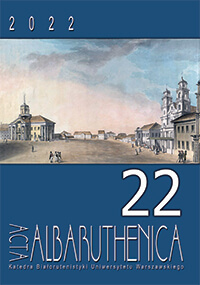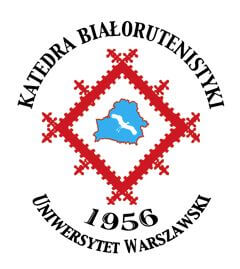Acta Albaruthenica N° 22/2022

Contents
On the occasion of the 140 th anniversary of the birth of Yanka Kupala
- 7 Anatol Bahdzevich, The pragmatic potential of the structure of Yanka
Kupala’s poetic titles - 19 Anatol Brusevich, Yanka Kupala’s creed: the Christian aesthetic code
in the motif paradigm of his early poetry
STUDIES AND ARTICLES
- 37 Vanda Barouka, Belarusian parody of the second half of the 20th century:
the phenomenon of the plot with variations - 53 Mikałaj Chaustowicz, An attempt to reconstruct the biography of Yulian
Lyaskovsky - 97 Aliaksandr Makarevich, Characteristics of the artistic world of the
tragedy Kastus Kalinouski (Death and immortality) by U. Karatkevich
as an artistic version of historical facts - 123 Anzhela Melnikava, Belarusian literature in the research of Ryszard
Radzik - 137 Michał Sajewicz, The surnames of the inhabitants of Lewkowo in the
former Grodno district in the middle of the 18 th century - 159 Maryna Antaniuk-Prouteau, The status of languages in Belarus: a his-
torical overview - 169 Natallia Bakhanovich, The image of creative personality in Belarusian
and Polish short prose at the turn of the 19 th
–20th centuries: comparative
aspect - 185 Alaxandr Brazgunou, The image of the Other in Belarusian literature
of the 16 th –18 th centuries - 201 Iryna Burdeljova, Multidirectional discourses in the literature of Belarus
of the 19 th century: U. Syrakomlya and P. Spilevski - 219 Nadzeya Chukichova, Story about the Iconographer and the Goldsmith
in the context of the formation of the poetics of the Belarusian literary plot - 229 Sviatlana Hanchar, Philosophical-aesthetic relationship between sound
and color (in Arthur Rimbaud’s sonnet The Vowels) - 241 Hanna Krofta, Functional pairs “struggle – victory”, “task – decision” in the
book Zavalnya, esqire, or Belarus in fantastic stories by Yan Barshcheuski - 251 Peter Martyn, Comparing and contrasting the post-1945 re-building of
Warsaw and Minsk city centres - 269 Iryna Shauliakova-Barzenka, Artistic conceptosphere as an ontological
precondicion and an existential project of national literature - 285 Natallia Slizh, Zodiacal lunaries in the Codex Suprasliensis
- 303 Anatol Traϐimchyk, The ethnic picture of the Homeland in the works
of Arthur Bartels - 319 Dzmitry Sudnik, On one grammatical innovation in the Belarusian Catholic
sociolect: svyataya Tereza ad Dzіcyatka Ezusa vs svyataya Tereza ad
Dzіcyatkі Ezusa vs svyataya Tereza ad Dzіcyatka Ezus vs svyataya Tereza
ad Dzіcyatkі Ezus
VARIA
- 331 MATERIALS
- 333 Hanna Barvenava, The significance of objects from the collection of the
Ethnographic Museum in Poznań for understanding Belarusian emigration
in the 20 th century - 339 Maryla Chaustowicz, A little-known manuscript of the 18 th century
- 349 REVIEWS
- 351 Agnieszka Goral, Polsko-wschodniosłowiańskie pogranicze językowe
w badaniach profesora Michała Sajewicza, Wydawnictwo KUL, Lublin
2022, pp. 160.
(Ewa Golachowska) - 354 М.Р. Прыгодзіч, Аўтарская неалагізацыя ў беларускай мове, Бела-
рускі дзяржаўны ўніверсітэт, Мінск 2021, 175 c.
(Radosław Kaleta) - 357 Ірына Часнок-Фаменка, Наратыўныя стратэгіі ў літаратурным
тэксце: вучэбна-метадычны дапаможнік, Выдавецтва БДУ, Мінск
2020, 143 с.
(Nadzeya Chukichova) - 360 Walentyna Sobol, Filip Orlik (1672–1742) i jego diariusz, Wydawnictwa
Uniwersytetu Warszawskiego, Warszawa, 2021, 532 c.
(Angela Espinosa Ruiz) - 363 Зоя Траццяк, Беларуская і амерыканская проза пра Першую су-
светную вайну: узроўні параўнальнага вывучэння, Выдавецтва
Полацкага дзяржаўнага ўніверсітэта, Наваполацк 2021, 320 с.
(Natallia Lysova)
